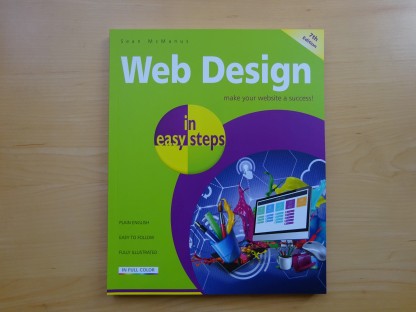
Coding Compendium
A free 100-page ebook collecting my projects and tutorials for Raspberry Pi, micro:bit, Scratch and Python. Simply join my newsletter to download it.
The Author, Autumn 2006
In this article, originally published in The Author magazine (published by the Society of Authors in Autumn 2006), Sean McManus provides a beginners' guide to setting up and operating an author website
Before you start to promote yourself online, you've got to ask yourself some challenging questions. The first one is why anyone should visit your website. Google lists over 11 billion webpages, so what will make yours stand out? People are busy. If you can't describe your website in terms of benefits to them, you're unlikely to persuade them to spend time there.
Chief among benefits are free information and entertainment. Content is king and, as authors, we are the kingmakers. Some writers (including Dilbert cartoonist Scott Adams and marketing expert Seth Godin) publish entire books online as free downloads. They believe that it's the best way to attract people to their ideas, and that this will spill over into book sales.
Most publishers aren't that daring, but will happily let you put chapters online. Getting people to download a chapter of the book is like getting someone to pick up a book in a shop and thumb through it. If they don't buy, there's nothing lost, and people will often value free book chapters more highly than articles of a similar length.
Other benefits you can offer include signed copies, exclusive articles and tutorials, sneak previews of works in progress, otherwise unpublished news updates and commentary, and a community forum where readers can chat with each other.
JK Rowling's website includes deleted scenes from the Harry Potter books, a radio show starring her characters and a puzzle game threaded throughout the site. Admittedly, Rowling's site is a big budget development, but you can provide an engaging experience for a fraction of the cost.
The other key question you need to ask yourself is how many books you expect to sell and how much money you can make from the site. There's no point spending thousands developing a site that will only make hundreds of pounds. Technology changes too fast to be thinking about a return on investment period of longer than a year.
There are a few different options when it comes to selling books:
Once your site has a reasonable level of traffic, you might find it's worth hosting Google's Adsense adverts on your site. Google will feed text ads to your site that match your content, and pay you a commission on the money it made for any ads that are clicked on.
So that's the income side of the equation. Now, how much does it cost to operate online? You'll need to have access to the internet, which typically involves paying an internet service provider (ISP) about £12 a month or £25 if you want a high speed connection (broadband). You'll need to pay a hosting company to make your website available to people who want to see it over the internet. A good small-business-quality service will cost about £10 a month. You can find ISPs and hosting companies listed in the back of internet magazines, including .Net magazine. On top of that, it is essential that you buy your own domain name, which will cost about £1 a month.
A domain name is like your address on the internet and it typically looks like yourname.co.uk or yourname.com (mine is sean.co.uk). There are lots of companies that will let you set up a website using their resources, often for free. Google's Page Creator (since discontinued), for example, will help you build a website that lives at www.yourname.googlepages.com. The problem with that is that Google controls your traffic - it owns googlepages.com, so if it decides it doesn't want to host your website any more there's nothing you can do about it. That's why it's important you buy your own domain name and promote it instead of Google's. You can still point it at Google's free service or anywhere else, but if things go wrong, you keep control of the incoming visitor flow you've built up. You just make your domain name take visitors somewhere else when they type it in.
Here's a summary of the costs:
| What to buy | Why buy it? | Cost |
|---|---|---|
| Internet Service Provider (includes email) | To let you access the internet | £12 per month (dialup) or £25 per month (broadband) |
| Domain name | So people can find where your website is stored | £ 1 per month |
| Web hosting (might include domain name) |
So the public can access your text and pictures over the internet | £10 per month |
| Tea | Helps concentration | £1 per month |
| Biscuits | Helps concentration | £1 per month |
| Total: £24 per month (dialup) or £38 per month (broadband) |
These costs are just the operating costs, of course: the cost of having a site designed varies wildly, so it's worth shopping around. The hidden costs come when the site needs updating: make sure you can afford to not just set up the site, but update it whenever you have news to tell. The simplest solution is to get your designer to incorporate a blog in your website. A blog is an online diary, but it's easy to update from anywhere there's an internet connection without needing any website design skills.
Building the site is only half the battle, of course. You've still got to persuade people to visit it. There's a whole science around getting high rankings in search engines but at its core are a few simple ideas.
The first is to make sure your site is easy to navigate so that search engines can find their way from page to page. If you use a link checker like www.linkalarm.com (costs US$0.01 per page checked), it will show you which pages a robot can find on your site: it should be all of them. Sophisticated animations can sometimes stop search engines getting in, so make sure they're used as added extras and are not required to explore the site.
It's important to use the kind of words in your site that people might use if they're looking for your content. Don't overdo it, otherwise search engines will think you're trying to trick them and might ban you, but do try to incorporate popular search keywords where they belong in your text. Google has an advertising system called Adwords that enables you to put adverts against search keywords. You can create a dummy advertising campaign to find out which keywords are most frequently searched in Google.
Search engines will understand that words in headlines are more important than other words on the page, provided you create your site so that they know what a headline is. This is something your designer will do behind the scenes for you if you ask them to use structural mark-up.
Perhaps the most important thing you can do to improve your search engine ranking is to get people to link to your site. Many search engines (including Google) consider a link to a website to be like a vote for its quality. Usually you'll have to give a link back to another site if you expect one in return. Avoid any bad neighbourhoods (decline invitations to exchange links with casino sites) and court one-way links into your site where possible. You can use Google's free toolbar to see how important Google thinks a webpage is (shown by its PageRank). Links are worth more to you in Google's eyes if they come from pages with a higher PageRank. The best links are those that real people will see and use to visit your site, and which search engines will also consider a good vote for your quality.
Search engines will eventually stumble across your site if it has lots of incoming links, but it'll take some time. Most search engines will let you tell them about your site so that they can consider indexing it. For Google, which currently accounts for most web traffic, this is free. Some search engines will charge to include your site, but will probably only deliver a fraction of the traffic that Google does. There are lots of services that charge to submit your site to lots of search engines in one go, but these are best avoided. Some search engines get shirty if you submit too often, and the submission services are often out of date. It is time-consuming, but it's an important enough job to justify visiting each of the search engines in turn (including Google, Yahoo, and MSN) and finding out how to submit. Look for 'Suggest site' or 'Add URL' links in the 'About Us' or 'For Webmasters' section.
As well as trying to find new visitors, it's important to look after existing visitors. Create an email newsletter to keep in touch with them (it's free via www.yahoogroups.com). Give them downloads as a souvenir of their visit that incorporate your website address, such as book chapters, pictures for their Windows background, or reference sheets. Ask them to bookmark your site and make sure you update it regularly so there's something to come back for. They say that people need about seven exposures to something before they will buy it and by making a site that people will return to, you can increase your chance of making a sale.
The key to running a successful site is to set up something manageable. If you don't have time to keep a site maintained, just put a single page and a downloadable chapter online, and link through to Amazon for the sales. If you've got time, set up a blog (it's free and takes about ten minutes through www.blogger.com), write exclusive content for the site and update your website regularly with your news and views. The more you put into your website, the more you'll get out in terms of both sales and satisfaction.
Although we've focused on the sales potential of the internet, there's a great creative opportunity too. The more you engage with readers, the easier it will be to find out what makes them tick and what kinds of ideas they like to play with. By setting up a website, authors can create a community around their work and communicate directly with readers all over the world.
© Sean McManus. All rights reserved.
Visit www.sean.co.uk for free chapters from Sean's coding books (including Mission Python, Scratch Programming in Easy Steps and Coder Academy) and more!

A free 100-page ebook collecting my projects and tutorials for Raspberry Pi, micro:bit, Scratch and Python. Simply join my newsletter to download it.

Web Design in Easy Steps, now in its 7th Edition, shows you how to make effective websites that work on any device.

Power up your Microsoft Excel skills with this powerful pocket-sized book of tips that will save you time and help you learn more from your spreadsheets.

This book, now fully updated for Scratch 3, will take you from the basics of the Scratch language into the depths of its more advanced features. A great way to start programming.

Code a space adventure game in this Python programming book published by No Starch Press.

Discover how to make 3D games, create mazes, build a drum machine, make a game with cartoon animals and more!